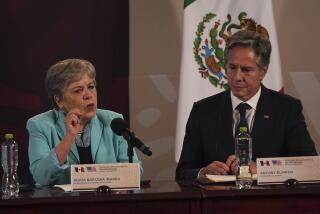U.S. Use of Bases in Philippines Renewed
- Share via
MANILA — A decade after the Philippines kicked the United States military out of the country, President Gloria Macapagal Arroyo said Monday that the international fight against terrorism has turned the two countries into close allies again.
Arroyo, who visited Washington last month and won a promise of $100 million in military aid, said the United States has resumed using its former bases in the Philippines for refueling and storage for forces heading to Afghanistan.
“The important thing is the strategic alliance has been redefined and reaffirmed,” Arroyo said in an interview at Malacanang Palace. “The warmth is as it was in the old days when we were unequivocal allies.”
In a show of nationalism in 1991, the Philippine Senate refused to allow the United States to continue using its long-standing bases here, including Clark Air Base and Subic Bay Naval Station. U.S. forces left Clark and Subic the following year.
The two huge facilities have since been largely converted to industrial parks and tourist centers where FedEx, America Online, Reebok and Holiday Inn are among the biggest tenants.
Over the past three months, Arroyo has sought to reposition the Philippines as the United States’ closest ally in Southeast Asia. She was quick to condemn the Sept. 11 terror attacks and has repeatedly voiced her support for the U.S. anti-terror campaign.
In part, she has been motivated by a desire to get American help to combat the Abu Sayyaf, a ruthless gang of Islamic kidnappers that operates in the southern Philippines and staged a raid on a tourist resort in Malaysia last year.
The group has kidnapped four Americans and still holds two of them hostage, Kansas missionaries Gracia and Martin Burnham. The gang beheaded another captive, Guillermo Sobero of Corona, Calif., in June. All three were seized in May at a resort on the Philippine island of Palawan and taken to the island of Basilan.
The fourth American, Jeffrey Schilling of Oakland, was seized last year after he walked into the Abu Sayyaf camp. He was held for nearly eight months before being rescued by the Philippine military in April.
Before Sept. 11, the Arroyo government belittled Abu Sayyaf as a gang of bandits. Since then, Arroyo has redefined it as a terrorist group. The U.S. government agrees: It has included Abu Sayyaf on its list of international terrorist organizations.
In her comments Monday, Arroyo played down any change in her view of the group. “They were a bunch of bandits but a bunch of terrorist bandits,” she said. “We always considered them as that.”
Philippine officials say the United States has agreed to send armed advisors to Basilan to train special-forces troops in methods of tracking down the kidnappers and rescuing hostages. The U.S. advisors will carry weapons for defensive purposes, they said.
The United States has begun providing the Philippines with equipment, military intelligence and planning assistance in the hunt for Abu Sayyaf members.
Arroyo said the Philippines is prepared to send peacekeeping forces and a humanitarian contingent to Afghanistan if called upon by the United Nations. If needed, she said, Manila could dispatch Muslim peacekeeping units to Afghanistan.
“We will be prepared to do our part there when the call is made,” she said.
On a personal note, Arroyo said she and Bush have much in common. They were sworn into office on the same day and are both children of presidents. They have met and talked by phone several times.
“President Bush and I are very similar,” she said. “We think alike. We are very similar in many ways.”
The Philippines, a former U.S. colony, has long had close ties with the United States, and the countries have been allies in every war since World War II.
During the 1990s, when relations were strained by the expulsion of the U.S. military, economic ties between the countries remained strong. The United States is the Philippines’ largest trading partner and its biggest source of tourists.
More to Read
Sign up for Essential California
The most important California stories and recommendations in your inbox every morning.
You may occasionally receive promotional content from the Los Angeles Times.













